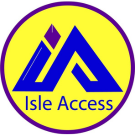Isle Access: Background Briefing Notes
Who is this for?
Over 31,000 residents have disabilities say Government statistics (and tourists add more), including mobility difficulties, visual or hearing impairment, chronic pain or fatigue or learning difficulties.
By helping people with disabilities directly, and helping organisations to improve their accessibility, we aim to improve quality of life for these neighbours – and for the community around them.
Why do we do this?
Society now feels that it’s only fair that people with disabilities enjoy the same level of access as others, both at work and in wider society. This was embodied in the Equalities Act (2010).
We feel it’s right to encourage more than the minimum legal requirement, to help our Island community become a fairer place to live – and visit – and bring better economic benefits for all.
How do we go about this?
We work in three main areas:
Directly with people who have a disability – we have a Cycling for WellBeing Team who provide adapted cycling events at several locations around the Island where individuals who cannot ride regular bikes can enjoy the exercise and have fun.
Indirectly for people with a disability – by working to improve facilities and support services in businesses and charities on the Island.
With Public Services – working with County Council and Town Councils, Social Services and NHS teams to help them improve their accessibility.
Where do we work?
Based in our current office in Ryde, we provide advice and other services around the Island, and Cycling for WellBeing events at a growing number of accessible locations.
What is Isle Access?
Isle Access is a Charitable Incorporated Organisation founded by Jan Brookes, CEO, in 2017. It has 4 Objects in its Governing Document (find details on the Charity Commission website here) which are to improve equality and diversity locally, to support carers, to create employment opportunities and to provide recreation, all aimed at gaining fairer access for disabled people on the Island.
As a charity, we receive no Government funding and have to apply for grants, seek sponsorships and donations, and offer our expert help as paid-for services to local businesses.
